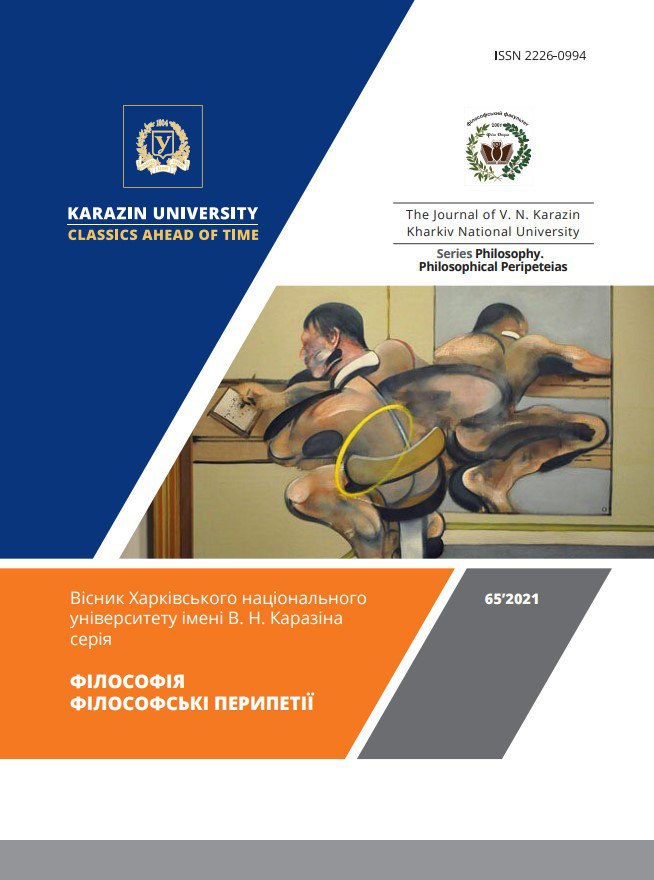MEASUREMENTS OF INEQUALITY IN POLITICAL METAMODERNISM (HANZI FREINACHT) AND THE AGE OF ACCESS (JEREMY RIFKIN)
Abstract
The article covers a multidimensional issue of social inequality. Most of sociological and philosophical studies concern informational, economic and gender inequality. However, for holistic understanding of the problem, it is important to take into account emotional, ecological and psychological components. Informational, economic and ecological inequality directly depend on access to truthful and scientifically based information from reliable sources, to opportunities of supporting oneself financially, to quality food products and safe environment, respectively. To overcome these types of inequality, access should be taken into account, as a concept, characteristics of which define the availability and accessibility of certain resources and the ability to satisfy either the need in clean drinking water or one’s social recognition by others. The correlations between the concept of “Age of Access” coined by Jeremy Rifkin and Hanzi Freinacht’s theory of metamodern politics are presented. The relevance of “access” to multidimensional inequality (one of the issues ideologists of political metamodernism work on) was analysed. A cohort of central actors in the age of access was reviewed. It includes metamodern aristocracy (hackers, hippies, hipsters, hermeneutics) and a group formed by cleanweb‑, bio‑, info‑ and 3D‑hackers. It was demonstrated that the abovementioned specialists are deeply involved in the regulatory processes of access control and/or its deprivation compared to other members of post-industrial societies.
In post-industrial societies with networked economy the role of access has significantly increased relatively to accumulation of material wealth and property ownership. On the one hand, building a just society requires overcoming the forces that somehow perpetuate inequality, and, on the other hand, providing the highest possible level of access to everything that increases equality between people. Those who are excluded from networks and deprived of access should not be forgotten; they don’t have access not only to resources, but can’t even have a discussion with the privileged ones about their own inferior condition. The reproduction mechanisms of the above-mentioned types of inequalities should be complemented by such a concept of access that would contribute to the eradication of inequality and/or provide us with more equitable solutions in case of insurmountable circumstances. Such solutions also might be applied to emotional and psychological inequality.
Downloads
References
Busarieva, T. G. (2018). Network Economy As a New Form of Economic Development. Scientific journal “Business Navigator”, 4(47), 9-13. https://doi.org/10.17223/1998863Х/43/15 (In Ukrainian: Бусарєва Т. Г. Мережева економіка як нова форма розвитку економіки. Науково-виробничий журнал «Бізнес-навігатор», 2018. Вип. 4 (47). С. 9-13).
Akker, R. van den, Gibbons, A., & Vermeulen, T. (Eds.). (2017). Metamodernism: Historicity, Affect, and Depth After Postmodernism. Rowman & Littlefield International.
Baudrillard, J. (2005). The Conspiracy of Art. Semiotext(e).
Cherry, C. (1985). The Age of Access: Information Technology and Social Revolution (W. Edmondson, Ed.). Croom Helm.
Deaton, A. (2015). The Great Escape: Health, Wealth, and the Origins of Inequality. Princeton University Press.
Dijk, V. J. (2005). The Network Society: Social Aspects of New Media (2nd ed.). Sage Publications Ltd.
Dijk, V. J. (2020). The Digital Divide (1st ed.). Polity.
Evans, M. (2016). The Persistence of Gender Inequality (1st ed.). Polity.
Fein, E. (2020). “Hanzi Freinacht (2017). The Listening Society. A Metamodern Guide to Politics. Book One. Metamoderna ApS” Reviewed by Elke Fein. Integral Review, 16(2), 273-284. https://integral-review.org/issues/vol_16_no_2_fein_review_of_freinacht_the_listening_society.pdf
Freinacht, H. (2017). The Listening Society: A Metamodern Guide to Politics, Book One (Metamodern Guides 1). Metamoderna ApS.
Freinacht, H. (2019). Nordic Ideology: A Metamodern Guide to Politics, Book Two (Metamodern Guides 2). Metamoderna ApS.
Grusky, D. B. (2014). Social Stratification: Class, Race, and Gender in Sociological Perspective (4th ed.). Routledge.
Jong, J. D., & Rizvi, G. (2008). The State of Access: Success and Failure of Democracies to Create Equal Opportunities (Brookings / Ash Center Series, “Innovative Governance in the 21st Century”). Brookings Institution Press.
Miller, H. J. (2007). Societies and Cities in the Age of Instant Access (GeoJournal Library, 88) (2007th ed.). Springer.
Rifkin, J. (2001). The Age of Access: The New Culture of Hypercapitalism, Where all of Life is a Paid-For Experience. New York: J. P. TarcherPerigee.
Rifkin, J. (2014). The Zero Marginal Cost Society: The Internet of Things, the Collaborative Commons, and the Eclipse of Capitalism. St. Martin’s Griffin.
Stiglitz, J. E. (2012). The Price of Inequality: How Today’s Divided Society Endangers Our Future (1st ed.). W. W. Norton & Company.
Storm, J. A. J. (2021). Metamodernism: The Future of Theory (First). University of Chicago Press. https://doi.org/10.7208/chicago/9780226786797.001.0001
Toffler, A. (1970). Future Shock. Random House.
Urry, J. (2000). Sociology Beyond Societies: Mobilities for the Twenty-First Century. Routledge.
Citations
INTERPRETATION OF THE PHENOMENON OF SOCIAL CONTROL IN POSTMODERNISM AND METAMODERNISM
VYSOTSKA Olha (2024) Epistemological Studies in Philosophy Social and Political Sciences
Crossref
Copyright (c) 2021 Олександр Манюков

This work is licensed under a Creative Commons Attribution 4.0 International License.
Authors who publish with this journal agree to the following terms:
- Authors retain copyright and grant the journal right of first publication of this work under the terms of a license Creative Commons Attribution License 4.0 International (CC BY 4.0).
- Authors are able to enter into separate, additional contractual arrangements for the non-exclusive distribution of the journal's published version of the work (e.g., post it to an institutional repository or publish it in a book), with an acknowledgement of its initial publication in this journal.
- Authors are permitted and encouraged to post their work online (e.g., in institutional repositories or on their website) prior to and during the submission process, as it can lead to productive exchanges, as well as earlier and greater citation of published work.






3.gif)




